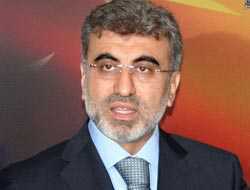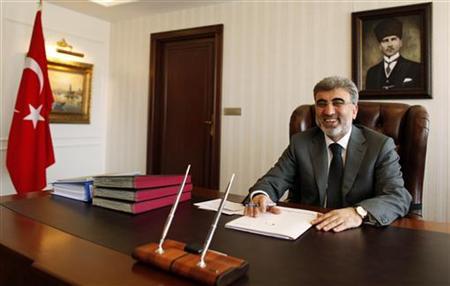Turkey Strengthens Nuclear Cooperation with Russia
Publication: Eurasia Daily Monitor Volume: 7 Issue: 213
November 30, 2010
By: Saban Kardas
Turkish Energy Minister, Taner Yildiz, welcomed the recent progress in Turkey’s first nuclear power plant project that will be built by Russia and underscored Ankara’s determination to develop nuclear energy through foreign partnerships. Yildiz told reporters that Russian President, Dmitry Medvedev, signed the inter-governmental agreement, which was recently ratified by both houses of the Russian parliament (Anadolu Ajansi, November 29).
After various futile efforts to issue a license for the construction of the country’s first nuclear plant in Akkuyu-Mersin on the Mediterranean coast through competitive bidding, Ankara opted for a more controversial method. Instead of an open tender, Turkey pursued a bilateral cooperation route and signed an inter-governmental agreement with Russia in May during Medvedev’s visit to Turkey (EDM, May 20). Under this agreement, Rosatom will build, own and operate the Akkuyu-Mersin plant comprising four 1,200 mega watt (MW) units. Rosatom will also raise the finances for the project and will posses 100 percent equity in the $20 billion project company undertaking the construction and operation of the plant. In the long-term, the Russian side will likely retain at least 51 percent of the company. A Turkish firm, Park Teknik, and the Turkish state electricity generation company –EUAS– may take significant shares in the project, while the state company will provide the site, and the state electricity distribution company, TETAS, will buy a designated proportion of the electricity generated at a fixed price of $12.35 (www.worldnuclear.org, November 29).
Through the completion of this project and other subsequent nuclear plants, the Turkish government hopes to bolster Turkey’s energy interdependence. In the new energy strategy document published in April, Turkey vowed to reduce its heavy dependence on imported fossil fuels, through greater utilization of Turkey’s renewable resources and nuclear energy. The construction of the first plant is expected to begin by 2014 and 5 percent of Turkey’s total electricity consumption will come from nuclear plants by 2023 (EDM, April 29).
Eager to see the construction work start, the Turkish government finalized the ratification process for the inter-governmental agreement this summer. However, the debates in the Turkish parliament reflect how the government’s energy policies and nuclear policy continue to evoke criticism from opposition parties. Representatives from the main opposition Republican People’s Party (CHP), junior opposition Nationalist Action Party and the pro-Kurdish Peace and Democracy Party criticized the government for failing to protect Turkish interests. Overall, they maintained that under the current agreement, Turkey would be unable to receive nuclear technology transfers and will remain a sole consumer of “Russian” electricity produced on Turkish soil. CHP representatives went as far as accusing the government of “betraying the country and insulting the Turkish nation… [succumbing to Russian plans]” (Anadolu Ajansi, July 15). Thanks to its majority, the government managed to secure the ratification of the agreement in parliament.
Speaking of Medvedev’s approval of the agreement, Yildiz noted that it will accelerate the work on the project. Yildiz expects to meet Russian Deputy Prime Minister, Igor Sechin, in Istanbul in mid-December to discuss the details related to forming the project company. Once those issues are resolved, Yildiz expects the project to proceed at a much smoother pace and overcome licensing issues, and obtain permission for the construction to commence (Cihan, November 29).
Ankara believes that from its partnership with Moscow, it will also receive help in developing its own nuclear technological know-how and infrastructure. Unlike its critics, the government believes that foreign partnerships will not hinder this objective. For instance, responding to questions in parliament, Yildiz referred to the experience of South Korea, noting that while that country relied upon imports to start building its nuclear plants in the 1970’s, it is now one of the countries which has developed its own nuclear technology.
Perhaps, in appreciation of the South Korean success story, Ankara held talks with the South Korean Electric Power Corporation (KEPCO) over the construction of the second plant in the Black Sea coastal city of Sinop. This coincided with South Korea’s new strategy of expansion in a bid to construct nuclear plants overseas (EDM, March 24). After an optimistic start, marked by various bilateral meetings and an exchange of high level visits, it was revealed that due to conflict over prices, state purchase guarantees and the share of state ownership in the nuclear plant, the talks had broken down. Yildiz argued that Turkey had a “plan B” if it proved unable to reach an agreement with South Korea and it will remain committed to its objective of having two plants by 2023 (www.usak.org.tr, Today’s Zaman, November 10). Quite expectedly, it was announced during Prime Minister, Recep Tayyip Erdogan’s, visit to South Korea that the talks came to an inconclusive end (Anadolu Ajansi, November 13).
After the failure of the talks with South Korea, Yildiz said that Turkey would continue its quest for a second agreement. Yildiz also ruled out the possibility that Ankara may grant the second site to Moscow. “Neither Russia, nor Turkey are considering [a second agreement],” Yildiz said. Yildiz announced that the Japanese Toshiba would be invited to Turkey for negotiations on the planned construction of the second plant. Although Tokyo has wanted to enter into such talks with Ankara for some time, the Turkish government has avoided this, “out of courtesy for the ongoing talks with South Korea,” as Yildiz put it (Anadolu Ajansi, November 15, November 25).
Nonetheless, it is instructive to note that, although no official contact with Japan on nuclear cooperation had taken place, the Turkish energy ministry and the Japanese New Energy and Industrial Technology Development Organization signed a letter of intent to cooperate on clean energy, energy productivity and the use of renewable energy in Ankara (Anadolu Ajansi, November 9). Therefore, the “plan B”’ Yildiz referred to was evidently the Japanese option. Turkey seems determined to consider seriously the diversification of its nuclear partnerships, by exploring, and perhaps pitting against each other, all options on the table.
https://jamestown.org/program/turkey-strengthens-nuclear-cooperation-with-russia/






